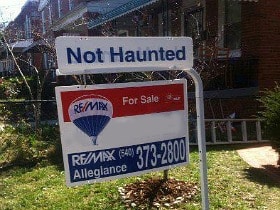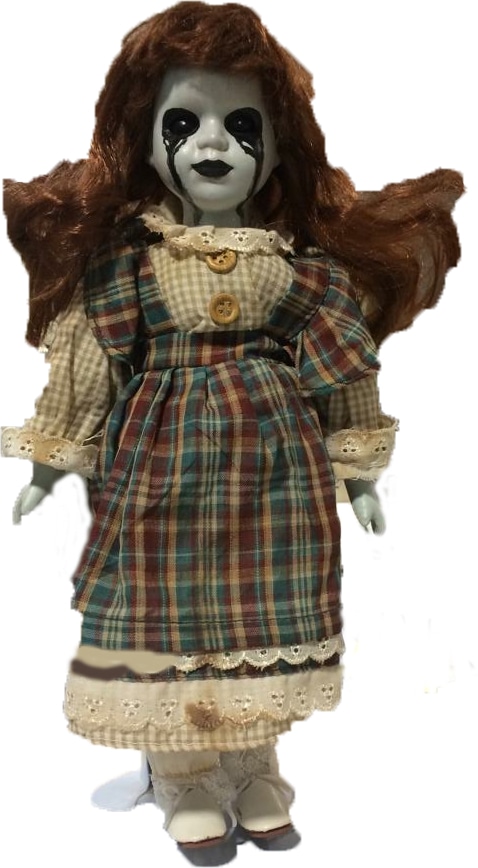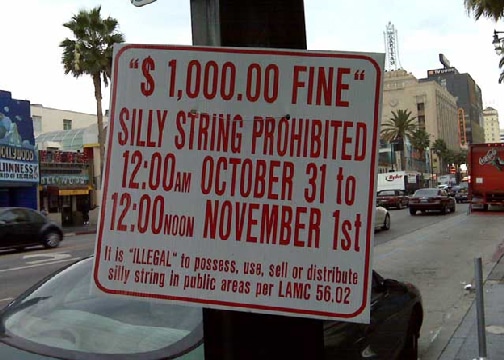By Lindy F. Bradley, Esq.
As Californians prepare to fill our cauldrons with candy and don our creepiest costumes, here are a few interesting legal facts to fuel those broomsticks this Halloween season!
Sellers must tell prospective home buyers about their family ghosts…
Anyone who has ever bought or sold a house already knows that sellers must disclose “material facts” to prospective buyers prior to the finalization of the sale. Some of these material facts can include termites, mold, mildew and unpaid taxes, among other things. But what about the ghost of your uncle Stanley whose phantom spectre appears from time to time to visit on the weekends? According to California law, a death on the property should be disclosed if it occurred within the last three years (California Civil Code §1710.2). However, if a buyer asks, a seller is also required to provide death related information beyond the three year period. As for your friendly (or unfriendly, as it may be) haunted house, other states like New York have allowed home sales to be voided once the buyer found out that their prospective new home was a local haunted legend. Disclosing the spooky nature of a house is not always a bad thing. In Hollywood, your house could end up on a ghost tour, and may create a unique selling point forthe right buyer.

A Few More Thoughts on Haunted Houses…
For many, the prospect of being chased around by a machete wielding giant covered in gore in a dark house filled with skeletons and mummies is just what the doctor ordered on Halloween. However, beware of the obvious dangers! The activities that occur in a haunted house entertainment attraction are not necessarily the safest form of Halloween entertainment. Moreover, if machete man actually catches you, or if you injure yourself in the process of fleeing from him, you may be out of luck in the bright light of day. In Griffin v. The Haunted Hotel, Inc.(2015) 242 Cal.App.4th 490, plaintiff, a guest of a haunted house was exiting the attraction when he was given one last scare by a character holding a gas powered chainsaw. Not unexpectedly, plaintiff ran away in a hurry. Unfortunately for our suddenly fearful plaintiff, chainsaw man continued to chase him. Plaintiff subsequently injured himself while fleeing. Plaintiff sued for his injuries, alleging negligence and assault. The California Court of Appeal affirmed the haunted house operator’s Motion for Summary Judgment and dismissed the case, holding that plaintiff had assumed the risk of a recreational activity that posed inherent risks of injury, and the operator had no duty to eliminate those inherent risks. Practical Pointer: If you hear a chainsaw on your way into the house, you may be assuming the risk of an inherently dangerous activity!



Your own Haunted House: A Final Warning to Beware…
There is always that one house on the block that goes all out for Halloween. Flashing lights, smoke, ghouls and goblins on the walls. All the kids in the neighborhood love the house, and depending on their age, will seek candy there first or avoid the house completely. This is part of the fun of Halloween. However, as a homeowner, we take our “victims” as we find them. Liability to an “eggshell” plaintiff is not lessened because the victim was particularly sensitive to your Halloween surprise (fake blood, body parts, severed heads, etc.) While it might be difficult to recover damages for emotional distress in these kinds of scenarios, depending on the extremity of the scare or prank involved, conduct that is so extreme as to exceed all bounds that are usually tolerated in a civilized community, may be compensable. So, on this exciting night filled with candy, costumes and ghosts, it may be advisable to give a second thought to re-creating the Carrie Prom scene at your front door. Rest assured happy haunters: merely suffering a momentary shock or hurt feelings is not enough. It may, however, impact how you get along with your neighbor at the next block party!
Silly, but True!
If you feel the clammy, drippy touch of something foreign as you trick or treat this Halloween, in Los Angeles County, better hope it is a cobweb and not silly string! On Halloween, it is illegal to use silly string! Since 2004, Halloween revelers are prohibited from using silly string between 12:00 am on October 31, to 12:00 p.m., on November 1 (Section 56.02, Los Angeles Municipal Code). Just when you might believe the trick is worth the treat, consider this: the fine for being caught using the stringy goo is $1,000.00!

Bradley & Gmelich wishes each and every one of you happy haunting this Halloween! Boo safely!

